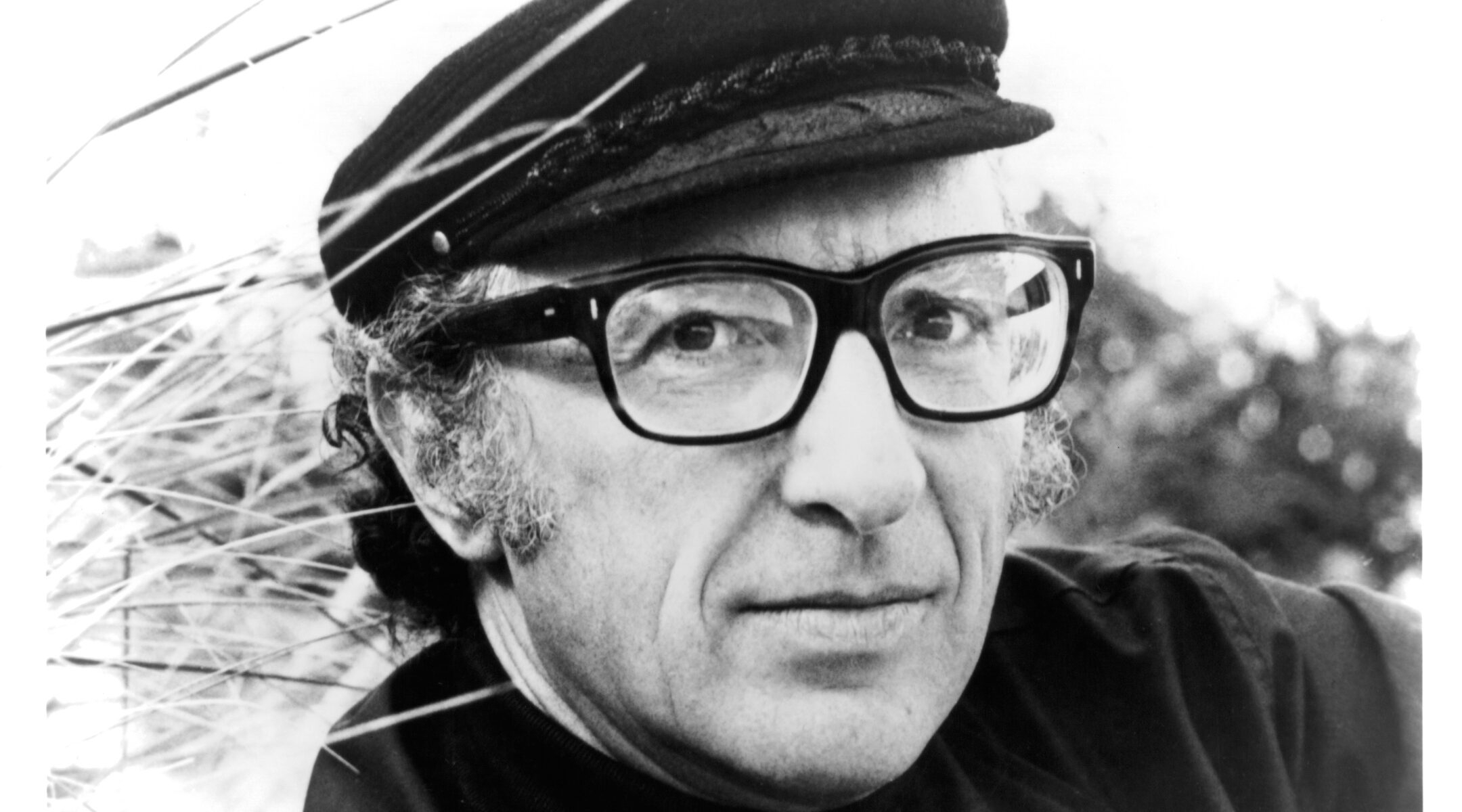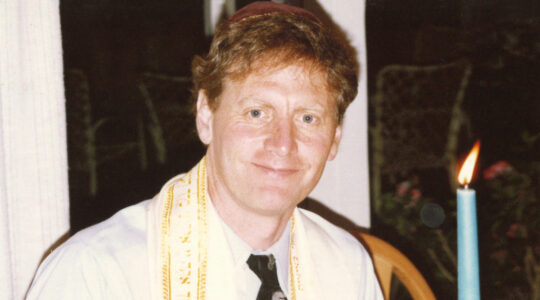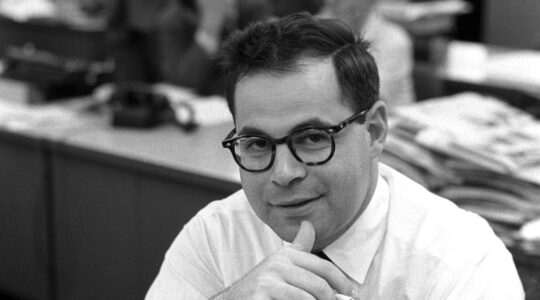(JTA) – The moment when Sheldon Harnick realized that his new musical might be something special came when he sang the lyrics he had just composed for a new song: “Sunrise, Sunset.”
He was sitting in the basement studio of his friend and collaborator, the composer Jerry Bock, in New Rochelle, New York. It was 1961, and they were in the throes of writing “Fiddler on the Roof.” Bock had originally meant for the melody to be used for one of the flirtations between Tevye’s three older daughters and their male interests, according to “Wonder of Wonders,” a book about “Fiddler” by Alisa Solomon.
Harnick went a different direction — writing lyrics about the agony of unleashing a child into adulthood that would eventually be sung in the musical’s pivotal wedding scene. When he was finished singing, Bock’s wife Patty was weeping.
“We hoped with any luck that it might run a year,” Harnick said in 1981 on “The Songwriters,” a PBS showcase series. “We were totally unprepared for the impact the show would have literally around the world.”
Harnick — whose paeans to Jewish tradition have become internationally appreciated as a reflection of cultural loss — died Friday at his home in Manhattan. He was 99, and was the last surviving creator of “Fiddler on the Roof.”
Harnick was born in Chicago in 1924, and was in his teens when he first encountered the stories of Sholem Aleichem, which later formed the basis for the musical. But at the time, he “wrote them off,” Solomon quotes him as saying.
Twenty or so years later, a friend gave him Sholem Aleichem’s novel, “Wandering Stars,” about a decades-long show business romance, and Harnick was enchanted. As an adult, Harnick found that Sholom Aleichem’s writing was “wonderfully human and moving and funny,” Solomon quotes him as saying. He had started working with Bock in the late 1950s, and told him and another partner — Joe Stein, who wrote books for musicals — that it could be good material to adapt for the stage.
Stein said “Wandering Stars” was too vast and complex to adapt. But what about Sholom Aleichem’s short stories, which Stein’s father would read to him as a child, in Yiddish? The trio searched Manhattan for an extant English copy of the stories, and found a second-hand copy at a bookshop on Park Avenue South.
Years later, Harnick told Solomon that what appealed to them about Sholom Aleichem’s short stories was the universal longing for a simpler past, rooted in one’s traditions. “Over and above the beauty of the stories themselves, there was another reason why we were all drawn to this material, which can perhaps be best illustrated by a title which Mr. Stein suggested: ‘Where Poppa Came From,’” he said.
They had the first formal meeting in 1961 to plan the musical, and it opened three years later starring Yiddish theater veteran Zero Mostel. “Fiddler” ran for more than 3,200 performances, which stood as a Broadway record for a decade, and won multiple awards. It has had countless revivals in countless languages, including Yiddish, and made stars of people as diverse as Bea Arthur, who played Yente the matchmaker; Bette Midler, as Tzeitel, the eldest daughter; and Topol, the Israeli actor whose earthy performance as Tevye in the 1971 film classic obscured Mostel’s more Yiddishist take.
In 1964, just weeks after “Fiddler” opened — and not yet aware of its massive impact — Harnick and Bock gave a televised master class on what the musical’s composition involved. They said they started writing a song about a family and then realized it was more about a community. A song about the hurried preparations for Shabbat — in which the daughters reassure their mother, Golde, that they will be ready in time for the day of rest — instead became an iconic one about preserving tradition, which opens the show. They consulted books on Jewish tradition to write it.
“What we would do is do an opening number that tried to compress a lot of traditional things into the opening,” Harncik said. “And as [director] Jerome Robbins said, the show would play against this opening number as though we had a tapestry. From the minute you heard the opening, you would know what this show is about: tradition.”
Bock interjected to explain that it wasn’t as easy as Harnick was making out.
“What Sheldon did was condense one thousand pages… into a seven minute song,” Bock said. “So in effect, the opening of our show now, I think, helped us get on the road to other people outside of the Jewish people being able to appreciate what our story was.”
In a 2011 documentary, “The Legacy Project,” Bock described the elation he felt when Harnick successfully set words to one of his melodies. He called them “moments of truth.”
“And they come when a lyric is finished and Sheldon sings the song for the first time,” he said in the documentary, released after his death in 2010. “There is nothing like that moment.”
Harnick and Bock had already written a Pulitzer Prize-winning musical infused with Jewish themes about Fiorello LaGuardia, New York’s first Jewish mayor, called “Fiorello!” They would go on to other successes together and apart, and stopped working together years after “Fiddler” due to a dispute over a musical about the Rothschild family, according to an obituary in The New York Times. .
But the lyricist never got over “Fiddler’s” success and global appeal. In a 2019 documentary on the show, he recalled attending an early Tokyo performance and being asked: “Do they understand it in America? It’s so Japanese.”
Not long after the show debuted, Harnick recalled in 1981, he realized it had an emotional depth he had not anticipated. He was at the theater watching Mostel and Maria Karnilova as Golde perform “Do You Love Me?”, a song about how even long married couples don’t truly know one another, and he burst into tears.
“I left the theater so I wouldn’t disturb anyone and I asked myself why I was crying,” he said. “Then I realized without knowing it I had put into the lyric deep feelings about my own parents — about what they had and had not been to each other. Sometimes it seems we only think we know why we write like we write.”
Harnick was married for a time to the Jewish director and comic writer Elaine May, who survives him, and is survived by his second wife, Margery Gray, their son and daughter, and four grandchildren.
JTA has documented Jewish history in real-time for over a century. Keep our journalism strong by joining us in supporting independent, award-winning reporting.






